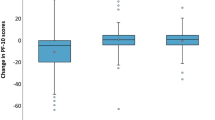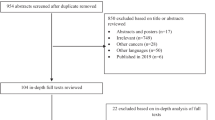Abstract
Objectives
Patients often struggle with their financial situation during cancer treatment due to treatment-related costs or loss of income. This resulting negative effect is called financial toxicity, which is a known as a side effect of cancer care. This study aimed to evaluate the association between financial toxicity and health-related quality of life among patients with gynecologic cancer using validated questionnaires.
Methods
In this multicenter study, patients with gynecologic cancer receiving anti-cancer drug treatment for > 2 months were recruited. Patients answered the COmprehensive Score for Financial Toxicity (COST) tool, EORTC-QLQ-C30, disease-specific tools (EORTC-QLQ-OV28/CX24/EN24), and EQ-5D-5L. Spearman’s rank correlation coefficient was used to determine associations.
Results
Between April 2019 and July 2021, 109 cancer patients completed the COST questionnaire. The mean COST score was 19.82. Strong associations were observed between financial difficulty (r = − 0.616) in the EORTC-QLQ-C30 and body image (r = 0.738) in the EORTC-QLQ-CX24, while weak associations were noted between the global health status/quality of life (r = 0.207), EQ-5D-5L index score (r = 0.252), and several function and symptom scale scores with the COST score.
Conclusions
Greater financial toxicity was associated with worse health-related quality of life scores, such as financial difficulty in gynecologic cancer patients and body image in cervical cancer patients as strong associations, and weakly associated with general health-related quality of life scores and several function/symptom scales.



Similar content being viewed by others
Data availability
Individual participant data that underlie the results reported in this article after deidentification and study materials are available upon reasonable request.
References
Thurgar E, Gouldson M, Matthijsse S et al (2021) Cost-effectiveness of pembrolizumab compared with chemotherapy in the US for women with previously treated deficient mismatch repair or high microsatellite instability unresectable or metastatic endometrial cancer. J Med Econ 24:675–688
Zafar SY, McNeil RB, Thomas CM et al (2015) Population-based assessment of cancer survivors’ financial burden and quality of life: a prospective cohort study. J Oncol Pract 11:145–150
Gharzai LA, Ryan KA, Szczygiel L et al (2021) Financial toxicity during breast cancer treatment: a qualitative analysis to inform strategies for mitigation. JCO Oncol Pract 17:1413–1423
Zafar SY, Peppercorn JM, Schrag D et al (2013) The financial toxicity of cancer treatment: a pilot study assessing out-of-pocket expenses and the insured cancer patient’s experience. Oncologist 18:381–390
Honda K, Gyawali B, Ando M et al (2019) Prospective survey of financial toxicity measured by the comprehensive score for financial toxicity in Japanese patients with cancer. J Glob Oncol 5:1–8
Hazell SZ, Fu W, Hu C et al (2020) Financial toxicity in lung cancer: an assessment of magnitude, perception, and impact on quality of life. Ann Oncol 31:96–102
Lenze NR, Bensen JT, Farnan L et al (2022) Association of self-reported financial burden with quality of life and oncologic outcomes in head and neck cancer. Head Neck 44:412–419
Shim S, Kang D, Kim N et al (2022) Validation of Korean version of the COmprehensive Score for financial Toxicity (COST) among breast cancer survivors. Cancer Res Treat 54:834–841
Kajimoto Y, Shibutani T, Nagao S et al (2022) Validity of the COmprehensive Score for Financial Toxicity (COST) in patients with gynecologic cancer. Int J Gynecol Cancer. https://doi.org/10.1136/ijgc-2022-003410.(inpress)
Perrone F, Jommi C, Di Maio M et al (2016) The association of financial difficulties with clinical outcomes in cancer patients: secondary analysis of 16 academic prospective clinical trials conducted in Italy. Ann Oncol 27:2224–2229
Durber K, Halkett GK, McMullen M et al (2021) Measuring financial toxicity in Australian cancer patients—validation of the COmprehensive Score for financial Toxicity (FACT COST) measuring financial toxicity in Australian cancer patients. Asia Pac J Clin Oncol 17:377–387
Arastu A, Patel A, Mohile SG et al (2020) Assessment of financial toxicity among older adults with advanced cancer. JAMA Netw Open 3:e2025810
Bouberhan S, Shea M, Kennedy A et al (2019) Financial toxicity in gynecologic oncology. Gynecol Oncol 154:8–12
Esselen KM, Stack-Dunnbier H, Gompers A et al (2021) Crowdsourcing to measure financial toxicity in gynecologic oncology. Gynecol Oncol 161:595–600
Esselen K, Sinno AK, Varughese J et al (2020) Social needs in gynecologic oncology: a Society of Gynecologic Oncology (SGO) clinical practice statement. Gynecol Oncol 158:521–525
Dickman SL, Himmelstein DU, Woolhandler S (2017) Inequality and the health-care system in the USA. Lancet 389:1431–1441
Ebi H, Bando H (2019) Precision oncology and the universal health coverage system in Japan. JCO Precis Oncol. https://doi.org/10.1200/PO.19.00291
Aviki EM, Manning-Geist BL, Sokolowski SS et al (2022) Risk factors for financial toxicity in gynecologic cancer patients. Am J Obstet Gynecol 226:817.e1-817.e9
Esselen KM, Gompers A, Hacker MR et al (2021) Evaluating meaningful levels of financial toxicity in gynecologic cancers. Int J Gynecol Cancer 31:801–806
Shankaran V, Leahy T, Steelquist J et al (2018) Pilot feasibility study of an oncology financial navigation program. J Oncol Pract 14:e122–e129
Sadigh G, Gallagher K, Obenchain J et al (2019) Pilot feasibility study of an oncology financial navigation program in brain cancer patients. J Am Coll Radiol 16:1420–1424
Kircher SM, Yarber J, Rutsohn J et al (2019) Piloting a financial counseling intervention for patients with cancer receiving chemotherapy. J Oncol Pract 15:e202–e210
Mutch DG, Prat J (2014) FIGO staging for ovarian, fallopian tube and peritoneal cancer. Gynecol Oncol 133:401–404
FIGO Committee on Gynecologic Oncology (2014) FIGO staging for carcinoma of the vulva, cervix, and corpus uteri. Int J Gynaecol Obstet 125:97–98
Honda K, Gyawali B, Ando M et al (2018) A prospective survey of comprehensive score for financial toxicity in Japanese cancer patients: report on a pilot study. Ecancermedicalscience 12:847
Shiroiwa T, Ikeda S, Noto S et al (2016) Comparison of value set based on DCE and/or TTO data: scoring for EQ-5D-5L health states in Japan. Value Health 19:648–654
Sasaki T, Aoyama M, Igarashi N et al (2022) Influence of financial burden on withdrawal or change of cancer treatment in Japan: results of a bereavement survey. Support Care Cancer 30:5115–5123
Nozawa K, Shimizu C, Kakimoto M et al (2013) Quantitative assessment of appearance changes and related distress in cancer patients. Psychooncology 22:2140–2147
De Souza JA, Yap BJ, Wroblewski K et al (2017) Measuring financial toxicity as a clinically relevant patient-reported outcome: the validation of the COmprehensive Score for financial Toxicity (COST). Cancer 123:476–484
Ministry of Health, Labour and Welfare (2019) Comprehensive survey of living conditions. Available at https://www.mhlw.go.jp/toukei/saikin/hw/k-tyosa/k-tyosa19/index.html (Accessed 19 Mar 2022) (Japanese)
Oshima SM, Tait SD, Rushing C et al (2021) Patient perspectives on the financial costs and burdens of breast cancer surgery. JCO Oncol Pract 17:872–881
Ezeife DA, Morganstein BJ, Lau S et al (2019) Financial burden among patients with lung cancer in a publicly funded health care system. Clin Lung Cancer 20:231–236
Aviki EM, Thom B, Braxton K et al (2022) Patient-reported benefit from proposed interventions to reduce financial toxicity during cancer treatment. Support Care Cancer 30:2713–2721
Acknowledgements
We thank the patients and their families as well as the investigators and site personnel involved in the study. English language editing was performed using Editage. This work was partly presented as an oral presentation at the 2022 Japanese Society of Medical Oncology Annual Meeting in Tokyo, Japan, on February 17-19, 2021.
Funding
The authors received no specific funding for this work.
Author information
Authors and Affiliations
Contributions
YK contributed to conceptualization, methodology, formal analysis, resources, data curation, writing the original draft, and project administration. KH contributed to conceptualization, methodology, resources, investigation, and writing of the original draft. LT performed writing, review, and project administration. KF contributed to methodology and writing—review. AI contributed to conceptualization, methodology, formal analysis, writing—review and editing, and supervision. Other authors contributed to investigation, resources, writing, review, and editing.
Corresponding author
Ethics declarations
Conflict of interest
Yusuke Kajimoto is an employee of the MSD K.K. Ataru Igarashi received a consultant fee, grants, and other from Pfizer Japan Inc. and Terumo Corporation; a consultant fee and grants from Beckton Dickinson and Company, Milliman Inc., and Taiho Pharmaceutical Co. Ltd.; a consultant fee and others from Abbvie GK, Ayumi Pharmaceutical Inc., Chugai Pharmaceuticals Inc., Eisai Inc., GSK., Nippon Boehringer Ingelheim Inc., Novartis Pharma K.K., Novo Nordisk Japan Inc., Ono Pharmaceutical Inc., Sumitomo Dainippon Pharma Inc., and Takeda Pharmaceutical Inc.; consultant fees from Otsuka Pharmaceutical Co., Ltd. and Sanofi Japan Inc.; grants and others from Gilead Sciences K.K.; grants from Boston Scientific Japan Inc. and Intuitive Surgical GK.; others from Astellas Pharma Inc., CSL Behring Japan Inc., Fuji Film Inc. and Medilead Inc. The other authors have no conflicts of interest to declare.
Additional information
Publisher's Note
Springer Nature remains neutral with regard to jurisdictional claims in published maps and institutional affiliations.
About this article
Cite this article
Kajimoto, Y., Honda, K., Suzuki, S. et al. Association between financial toxicity and health-related quality of life of patients with gynecologic cancer. Int J Clin Oncol 28, 454–467 (2023). https://doi.org/10.1007/s10147-023-02294-1
Received:
Accepted:
Published:
Issue Date:
DOI: https://doi.org/10.1007/s10147-023-02294-1




